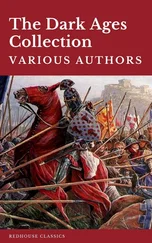Yet the Roman nobility were now compelled to contribute more largely to the maintenance of the military forces which defended Italy. The greater part of the land belonged to them, and by the new settlement one-third of their estates was taken from the proprietors, and Odovacar’s barbarian soldiers and their families were settled on them. It is not probable that the number of these soldiers exceeded 20,000 at the most, and it has been reasonably doubted whether this measure was actually carried out throughout the length and breadth of the peninsula. 84We may suspect that the needs of the army were satisfied without a drastic application of the principle of partition. If the illustrious landowners had been mulcted on a large scale, it is hardly credible that they would have co-operated with the king as loyally as they seem to have done.
Soon after the government of Italy had passed into his hands, Odovacar’s diplomacy achieved a solid success by inducing Gaiseric, who died in January, A.D. 477, to cede to him the island of Sicily. He undertook indeed to pay for it a yearly tribute, and the Vandal king reserved a foothold in the island, doubtless the western fortress of Lilybaeum. 85The death of Julius Nepos has been mentioned. He was murdered by two of his retainers in his country house near Salona in May, A.D. 480. Odovacar assumed the duty of pursuing and executing the assassins, and at the same time established his own rule in Dalmatia. 86The claims of Nepos, so long as he lived, had embarrassed the relations between Zeno and Odovacar; Zeno’s acquiescence in Odovacar’s position and the wishes of the Senate had been ambiguous and reserved. The death of Nepos relieved the situation, and there was no longer any difficulty at Constantinople about acknowledging the western consuls whom Odovacar chose. But the relations between the Emperor and his Master of Soldiers in Italy were always strained, and in A.D. 486 there was an open breach. 87Though Odovacar did not help the rebel Illus in his revolt, there were negotiations, and Zeno may have been suspicious and alarmed. Odovacar prepared an expedition into the Illyrian provinces, then pressed hard by the Ostrogoths, and Zeno averted it by instigating the Rugians to invade Italy. 88Odovacar anticipated their attack by marching through Noricum and surprising them in the winter season (end of A.D. 487) in their territory beyond the Danube. Their king Feletheus and his queen were taken to Italy and beheaded, and with the death of his son, against whom a second expedition was sent, the Rugian power was destroyed. 89
Of the internal government we know little. The Church was unaffected by his rule; 90as an Arian he held aloof from ecclesiastical affairs. As to the working of the Roman administration under a German ruler, acting as an independent viceroy, and the limitations imposed on his power, we have abundant evidence regarding Odovacar’s successor, Theoderic, and when we come to his reign the details will claim our attention.
§ 5. The Ostrogoths in Illyricum and Thrace (A.D. 477-488)
In the reign of Arcadius the Visigoths had seemed likely to form a kingdom within the Illyrian peninsula, before they invaded Italy and established their home in the west. We shall now see how history repeated itself in the case of the Ostrogoths, how they too almost settled in the lands of the Balkans before they went westward to found a kingdom in Italy. 91
It will be remembered that after the collapse of the Hunnic power in A.D. 454 the Ostrogoths, over whom three brothers ruled, Walamir, Theodemir, and Widemir, were allowed by the Emperor Marcian to occupy northern Pannonia, as foederati . 92After some years they were provoked by the Emperor Leo, who refused to pay an annual sum of 100 pounds of gold which Marcian had granted them; and they ravaged the Illyrian provinces and seized Dyrrhachium. Peace was made in A.D. 461, the money grant was continued, and Theoderic, 93the son of Theodemir, was sent as a hostage to Constantinople where he had the advantage of a Roman training. His education, however, in letters appears not to have advanced very fast, for it is said that he was never able to write. During those years his nation was engaged in wars with neighboring German peoples. 94They won a decisive victory over the Scirians which cost Walamir his life. His section of the Goths passed then under the rule of Theodemir, who had soon to resist a large combination of Scirians, Rugians, Gepids, and others. Both parties applied to the Emperor for support, and Leo, acting against the advice of Aspar who was friendly to the Ostrogoths, sent troops to help the Scirian league. In a sanguinary battle the Goths were victors (A.D. 469), and their predominance on the Middle Danube was established. 95Leo then considered it politic to cultivate their friendship and he allowed Theoderic to return to his people. The young prince at once distinguished himself in a campaign against the Sarmatians who had recently occupied Singidunum, and the Goths appropriated the city.
The last act of Theodemir seems to have been an invasion of the provinces of Dacia and Dardania, in which his army advanced as far as Naissus. 96Death befell him soon afterwards and Theoderic was elected as his successor in 471. 97Soon after his accession (before 475) he seems to have led his people from their Pannonian homes to a new settlement in Lower Moesia, the same regions which had once been occupied by the Visigoths of Alaric. 98There is no evidence that this change of habitation was sanctioned by the Roman Emperor; but it does not seem to have been opposed at the time.
After the collapse of the Hunnic empire a large number of Ostrogoths had taken service in the Roman army, and formed the most important part of the German forces on whose support Aspar had maintained his power. We have already met their commander Theoderic (son of Triarius), called Strabo, “squinter,” who was not of very distinguished descent but was related through marriage to the family of Theodemir. 99We may call him Strabo to distinguish him from his more famous namesake. We saw the hostile attitude which he assumed towards Leo after the death of Aspar. The German troops gathered round him and proclaimed him king. He then sent an embassy to Leo, demanding for himself the post of Master of Soldiers in praesenti which Aspar had held, and the inheritance of Aspar, and for his troops grants of land in Thrace. The Emperor was willing to appoint him to the generalship, but refused the other demands. Then Strabo ravaged the territory of Philippopolis and reduced Arcadiopolis by starvation. These energetic proceedings extorted concessions from Leo; he agreed to pay a yearly stipend of 2000 lbs. in gold (= £90,000) to the Goths and to allot them a district in Thrace, and he conferred the post of Master of Soldiers in praesenti on Strabo, who was to fight for the Emperor against all enemies except the Vandals, and “enemies” doubtless included the Goths of Theoderic. 100He was, moreover, to be recognised as king of the Goths. 101
In the troubles that followed Leo’s death, Strabo naturally took the part of Basiliscus against his old foe, while Zeno was supported by Theoderic. After his restoration Zeno deprived Strabo of his military post and bestowed it on Theoderic, whom he also created a Patrician, confirming him in possession of the lands which his people had seized in Lower Moesia and promising him an annual stipend. He even adopted him as a son, according to the German right of adoption.
But there were no sincere feelings behind this favour and friendliness. The policy of the Emperor was to play off one Goth against the other. In the three following years (A.D. 477-479) the relations between him and the two rivals shifted rapidly through all the stages of possible combinations. In the first stage Zeno and Theoderic are combined against Strabo; in the second the two Theoderics join forces against Zeno; in the third Strabo and Zeno co-operate against Theoderic.
Читать дальше












